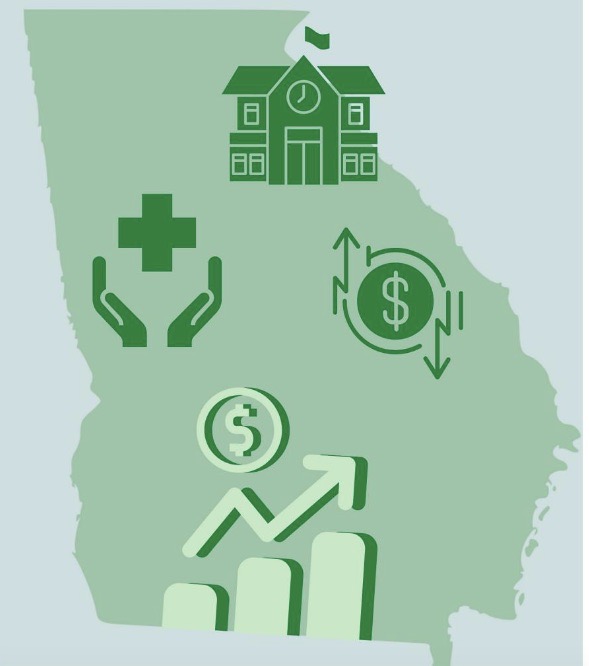Changes in funding for GA HOPE Scholarship
February 1, 2023
Though large and content-heavy textbooks are certainly intimidating, one of the biggest obstacles facing those pursuing higher education has always been their finances. The GA HOPE scholarship exists to help prospective students manage concerns about tuition payments in student debt.
“Yeah, it’s a pretty big relief,” said Alex Gerlach, a freshman biology major. “Although its challenges encourage growth, school can be pretty stressful and busy. The financial freedom HOPE offers me has basically given me the opportunity to commit to my studies in a way that really allows me to pursue my goals.”
However, the HOPE scholarship might not have been as helpful as it was intended to be in recent years. Back in 2011, a bipartisan coalition led by then-Governor Nathan Deal instituted a law (GA House Bill 326) that ushered in a series of cuts to the scholarship in response to the unfortunate economic situation of the GA Lottery, which funds the scholarship.
These cuts narrowed the scope of students eligible to receive benefits, as well as reducing the amount of cash awarded to those still eligible. After these cuts, HOPE no longer offered awards for mandatory fees or book costs and only covered a portion of the tuition of a public, in-state college. In addition, the GPA required to qualify for HOPE increased from 2.0 to 3.0, disqualifying nearly 9,000 former HOPE beneficiaries.
Needless to say, even despite the coalition’s best attempts to frame them in a positive light, these cuts were wildly unpopular. Deal’s coalition attempted to market the changes as encouraging academic achievement from students.
This angle largely fell flat considering that nothing was actually provided to high achieving students that they did not receive prior to the cuts. The only real change was a curtailment of the benefits less academically-accomplished students would receive. Then-House Minority Leader Stacey Abrams, though supportive of the cuts, made less of an attempt to be optimistic. She phrased the issue as a grim necessity, as something that must be done immediately to prevent more severe cuts later on.
The GA HOPE scholarship became something of a hot- button political issue following the 2011 bill. Just two years later, another bill was passed that returned the HOPE GPA requirement back to 3.0 after a large quantity of students backed down from pursuing college education, intimidated by the more stringent requirements (GA House Bill 372).
It is worth noting that this change was endorsed by Deal, who spearheaded the original bill. The issue of the HOPE scholarship would continue to be picked at in the following years, though rarely in such a substantial way as the 2013 bill.
For instance, Stacy Evans’ failed 2018 gubernatorial campaign structured around a promise to reinstate HOPE to its former capacity and make college tuition free or the allowances made to allow students who were unable to sit for SAT or ACT testing because of COVID-19 lockdowns to allow students to qualify for HOPE retroactively.
According to the Georgia Budget and Policy Institute, The HOPE scholarship budget would not see any real change until just recently, when Gov. Brian Kemp would allocate $61 million in lottery proceeds towards paying the tuition of HOPE recipients in his 2023-2024 spending plan, a budget plan that promises many other large windfalls for Georgia’s financially ailing education system. It includes a $2,000 pay raise for state-employed educators and an increase of more than $1billion for the public school system.
Kemp’s budget plan is poised to take a significant amount of strain off the currently overworked and underpaid staff of Georgia public school educators. This coupled with the large increase of available capital for school resources and Kemp’s stated intention to do away with HOPE’s two-tiered award system could lead to a new generation of well-cared-for and high-achieving students who have less-stringent requirements standing between them and higher education.
Unfortunately, this is far from a permanent solution to the issues the HOPE scholarship system might have. This is only a spending plan, not a firm law. Currently, HOPE’s economic well-being is dependent upon Brian Kemp’s plans for the state. If the gubernatorial office should change hands in the immediate future, the new governor may not place the same value on educational funding. Additionally, with the existence of GA House Bill 326, strong legal precedent exists for slashing HOPE’s benefits to the bone should the Georgia Lottery face another ironic turn of fortunes.
Though this spending plan is far from a guarantee for the future of Georgia’s education system, it is certainly enough to feel a little HOPE.







